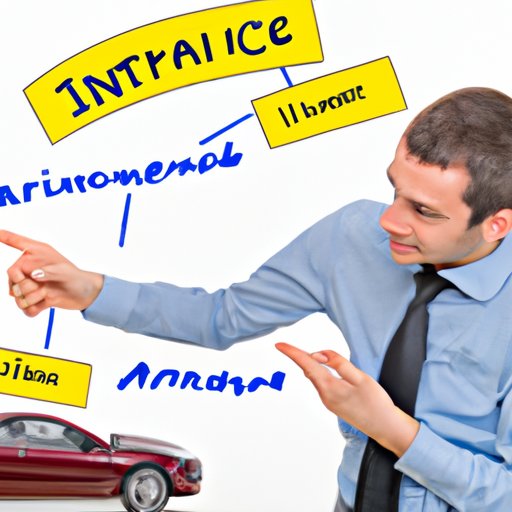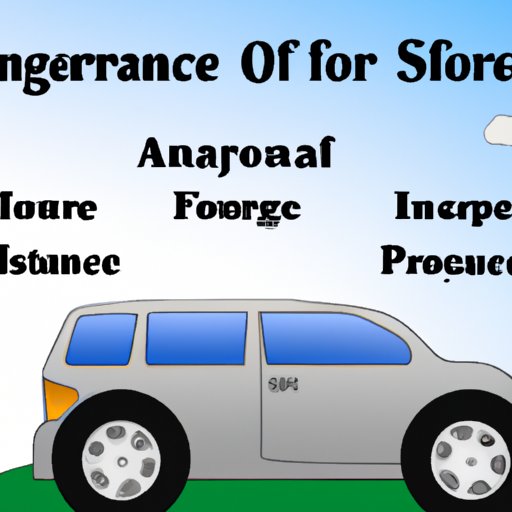Introduction
Car financing is becoming increasingly popular among drivers who are looking to purchase a new or used vehicle. As with any loan, when you finance a car, you are responsible for making regular payments and ensuring that your car is properly insured. But what kind of coverage do you need for a financed car? We’ll explore this question in more detail below.

Explaining the Different Types of Insurance for a Financed Car
When it comes to insuring a financed car, there are three main types of coverage you should consider: liability insurance, comprehensive and collision insurance, and uninsured/underinsured motorist coverage.
Liability Insurance
Liability insurance is the most basic type of car insurance and is typically required by law in most states. It covers bodily injury and property damage caused by an accident that you are found to be at fault for. In other words, if you cause an accident and someone else is injured or their property is damaged, liability insurance will cover the costs associated with that injury or damage.
Comprehensive and Collision Insurance
Comprehensive and collision insurance provide additional coverage beyond liability insurance. Comprehensive insurance covers damages to your car from things like theft, vandalism, fire, hail, and floods. Collision coverage pays for repairs to your car in the event of an accident. Both types of coverage are usually required by lenders if you are financing a car.
Uninsured/Underinsured Motorist Coverage
Uninsured/underinsured motorist coverage (UM/UIM) provides protection if you are involved in an accident with someone who does not have enough insurance to cover the costs of the accident. This type of coverage is typically optional, but it can provide valuable protection in certain situations.

What to Consider When Shopping for Coverage for Your Financed Vehicle
When shopping for coverage for your financed vehicle, there are several factors to consider. First, you’ll want to consider the cost of the coverage. The higher the coverage limits, the more expensive the policy will be. You’ll also want to consider the deductibles. A higher deductible means that you’ll pay more out of pocket if you need to make a claim, but it can also lead to lower premiums. Finally, you may want to consider additional coverage options such as rental car reimbursement, towing and labor coverage, and gap insurance.
How Much Does Financed Car Insurance Cost?
The cost of financed car insurance depends on a variety of factors, including the type of car you drive, your age, driving record, and the type and amount of coverage you choose. Generally speaking, the cost of coverage for a financed car is higher than for a car that is not financed. The average cost of coverage for a financed car is around $1,200 per year, although this number can vary significantly depending on the factors mentioned above.
Exploring the Pros and Cons of Different Coverage Options
When deciding which coverage option is best for you, it’s important to understand the pros and cons of each option. Let’s take a look at some of the most common types of coverage:
Liability Insurance
The primary advantage of liability insurance is that it’s typically required by law, so you won’t be breaking the law if you don’t have it. The downside is that it only covers damage to other people and property, not your own car. So if you get into an accident and your car is damaged, you’ll be responsible for paying for the repairs.
Comprehensive and Collision Insurance
The main benefit of comprehensive and collision insurance is that it covers damage to your own car in the event of an accident. This can provide peace of mind if you’re concerned about being able to afford repairs. The downside is that these policies can be quite expensive and may not be necessary if you have an older car.
Uninsured/Underinsured Motorist Coverage
The primary advantage of UM/UIM coverage is that it provides protection if you’re involved in an accident with someone who doesn’t have enough insurance to cover the costs of the accident. The downside is that it can be quite expensive and often isn’t necessary unless you live in an area with a high rate of uninsured drivers.

Understanding the Impact of Deductibles on Financed Car Insurance
Deductibles are an important factor to consider when shopping for car insurance. A deductible is the amount of money you must pay before the insurance company will pay out on a claim. Generally speaking, the higher the deductible, the lower the premium. However, it’s important to remember that if you do need to make a claim, you’ll be responsible for paying the deductible before the insurance company will pay out.
What to Do if You Can’t Afford the Required Coverage for Your Financed Car
If you can’t afford the required coverage for your financed car, there are some alternatives to traditional insurance. One option is to purchase a non-owner auto insurance policy, which can provide basic liability coverage without the need for a down payment. Another option is to purchase a low-cost liability policy, which can provide minimal coverage at an affordable price. Finally, if you’re unable to purchase insurance at all, you may be able to qualify for a state-sponsored program that can provide basic coverage at a reduced rate.
Conclusion
Buying a car is an exciting experience, but it can also be overwhelming. When it comes to insuring a financed car, it’s important to understand the different types of coverage available and how they can affect the cost of your policy. By understanding the basics of car insurance and exploring your options, you can find the right coverage for your needs at the right price.
(Note: Is this article not meeting your expectations? Do you have knowledge or insights to share? Unlock new opportunities and expand your reach by joining our authors team. Click Registration to join us and share your expertise with our readers.)
